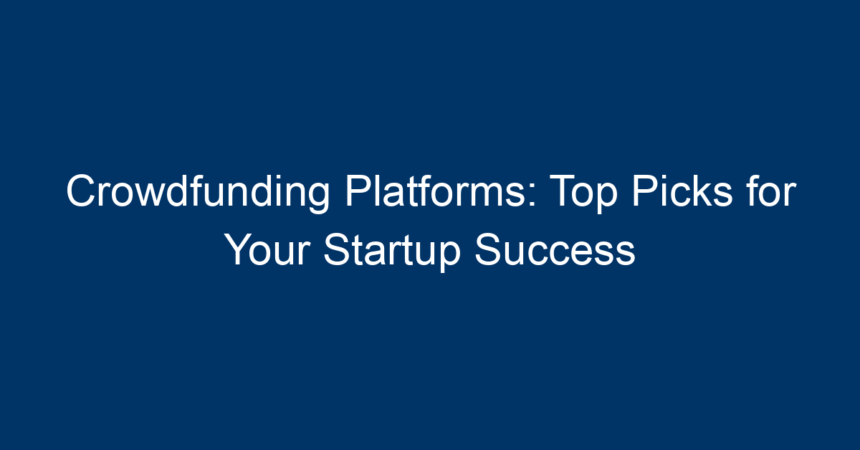In today’s dynamic entrepreneurial landscape, securing funding for a startup can be one of the most daunting challenges for aspiring business owners. Traditional funding avenues like bank loans or venture capital often come with stringent qualifications and extensive paperwork. Fortunately, crowdfunding platforms have emerged as a revolutionary method for startups to acquire capital while engaging their communities and fostering a loyal customer base. In this article, we’ll explore the top crowdfunding platforms available in 2023 and how they can facilitate your startup’s journey to success.
What Are Crowdfunding Platforms?
Crowdfunding platforms are online portals that allow individuals or organizations to raise money for business ventures, creative projects, or charitable causes through small contributions from a large number of people. By leveraging the power of the internet, entrepreneurs can reach a global audience to fund their ideas, whether through equity, rewards, or donation-based models.
Why Choose Crowdfunding for Your Startup?
-
Access to Capital: Crowdfunding provides an avenue to raise funds without giving away significant equity or incurring debt.
-
Market Validation: A successful crowdfunding campaign can serve as a litmus test for your product or idea, proving that there’s a market demand.
-
Community Engagement: Crowdfunding efforts often attract supporters who can become future customers or brand ambassadors.
- Marketing Exposure: Launching a campaign creates buzz around your startup, increasing brand visibility and attracting media attention.
Top Crowdfunding Platforms for Startups
Let’s dive into some of the best crowdfunding platforms available, each with unique features and advantages tailored for startups.
1. Kickstarter
Overview: Kickstarter is one of the most popular crowdfunding platforms, especially for creative projects, including art, music, film, and technology.
Key Features:
- All-or-Nothing Funding: You only receive funds if you reach your funding goal, encouraging backers to contribute.
- Creative Focus: Ideal for startups with innovative ideas or products that appeal to a community.
Pros:
- Large and active user base.
- Extensive resources for campaign planning.
Cons:
- High competition and fees (5% platform fee + payment processing fees).
Best For: Creative projects and innovative product ideas.
2. Indiegogo
Overview: Indiegogo offers flexible funding options, allowing startups to either keep what they raise or opt for an all-or-nothing model.
Key Features:
- Flexible Funding Options: Ideal for startups that want to raise funds but might not achieve their total goal.
- Global Reach: Supports international campaigns in various currencies.
Pros:
- Less stringent approval process compared to Kickstarter.
- Excellent educational resources for campaigners.
Cons:
- Lower visibility compared to Kickstarter.
Best For: A range of projects and products with flexible funding needs.
3. GoFundMe
Overview: Unlike other platforms, GoFundMe is primarily focused on personal causes and social projects, but it can also be used for startup funding.
Key Features:
- No Platform Fees: GoFundMe doesn’t charge fees for personal fundraising, though payment processor fees apply.
- Easy Setup: Setting up a campaign is straightforward and quick.
Pros:
- High level of social engagement.
- Suitable for nonprofits and personal causes.
Cons:
- Not dedicated to traditional startups or business ventures.
Best For: Personal and charitable projects, as well as community-oriented startups.
4. SeedInvest
Overview: SeedInvest offers equity crowdfunding, enabling startups to raise funds in exchange for equity stakes.
Key Features:
- Regulation A+ and Regulation Crowdfunding: Complies with SEC regulations, allowing startups to raise money from accredited and non-accredited investors.
- Due Diligence: Rigorous vetting process that enhances credibility.
Pros:
- Access to larger sums of investment.
- Attracts serious investors.
Cons:
- Extensive application process.
- Limited to equity-based crowdfunding.
Best For: Startups looking to offer equity offerings and attract more significant investments.
5. Crowdcube
Overview: Based in the UK, Crowdcube specializes in equity crowdfunding and allows startups to raise funds in exchange for shares.
Key Features:
- Investment Opportunities: Investors can choose from a variety of startups seeking funding.
- Strong UK Presence: Focused on the European market.
Pros:
- Attracts a community of engaged investors.
- Transparent platform.
Cons:
- Limited to UK and European startups.
Best For: UK-based startups looking to grow their business through equity financing.
6. Patreon
Overview: While not a traditional crowdfunding platform for startups, Patreon is ideal for creators and businesses that can generate ongoing content or products.
Key Features:
- Subscription-Based Model: Supporters can pledge a monthly amount for exclusive access to content.
- Community Engagement: Encourages a strong relationship between creators and their supporters.
Pros:
- Recurring revenue model.
- Creates a long-term engagement strategy.
Cons:
- Requires consistent content creation to retain supporters.
Best For: Content creators, artists, and service-based businesses.
How to Choose the Right Crowdfunding Platform
Choosing the right crowdfunding platform for your startup involves evaluating several factors:
1. Type of Startup: Consider the nature of your business. Are you a tech startup, a creative project, or a community initiative? Each platform serves different types of ventures.
2. Funding Model: Decide if you prefer an all-or-nothing model or a flexible funding option. This decision could significantly impact your campaign strategy.
3. Fees and Costs: Analyze the fee structures of various platforms. Understanding how much you’ll pay in fees will help you budget better.
4. Target Audience: Identify where your potential backers are likely to be. Some platforms have specific demographics that may align with your market.
5. Marketing Resources: Platforms that offer campaign resources and marketing tools can enhance your chances of success.
Actionable Insights for a Successful Crowdfunding Campaign
Launching a crowdfunding campaign can be an exhilarating yet challenging endeavor. Here are some actionable tips to help you succeed:
-
Craft a Compelling Story: Your campaign needs a strong narrative. Share your vision, mission, and the problem you’re solving in a relatable way.
-
Set Realistic Goals: Determine a funding goal that reflects your needs but is also achievable. Research similar campaigns to inform your target.
-
Develop a Marketing Plan: Promote your campaign through social media, email newsletters, and community outreach. Engagement is crucial.
-
Engage with Your Backers: Communicate regularly with your backers. Keep them updated on your progress, express gratitude, and involve them in your journey.
- Create Engaging Visuals: High-quality images and videos can make a significant impact. Showcase your product or project in the best light.
Conclusion
Crowdfunding platforms have transformed the way startups can access capital, disrupt traditional funding models, and engage with potential customers directly. With various platforms available, each offering its unique features and advantages, choosing the right one can set the stage for your startup success.
By understanding your funding needs, selecting the right platform, and implementing effective campaign strategies, you can elevate your startup’s visibility and financial backing in this ever-evolving business landscape. Don’t hesitate; take the leap and transform your ideas into reality with the power of crowdfunding!
Remember, your first step in this exciting journey can lead to incredible opportunities—choose wisely and engage passionately!




